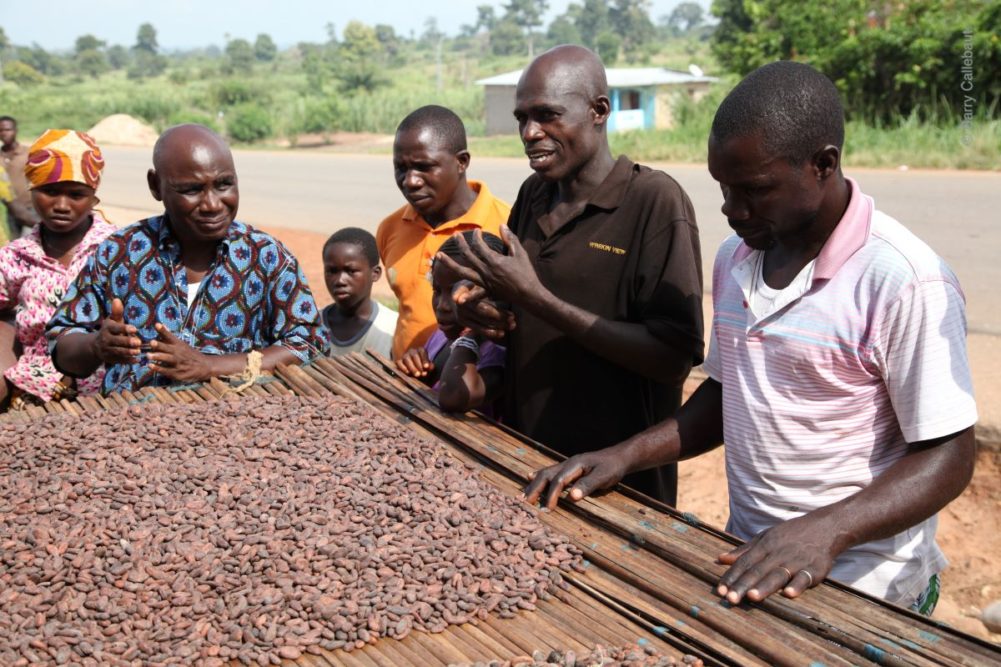ZURICH — Barry Callebaut made progress in using more sustainable ingredients in its products, monitoring child labor and increasing consumption of renewable energy in the 2021-22 fiscal year, according to its sixth annual “Forever Chocolate Progress Report” released Dec. 1. World issues, including the war in Ukraine, made it more difficult for the Zurich-based company to help lift cocoa farmers out of poverty, leading Barry Callebaut to offer more subsidies to the farmers.
Barry Callebaut’s 2025 goals include lifting over 500,000 cocoa farmers in the company’s supply chain out of poverty, becoming carbon and forest positive, having 100% sustainable ingredients in all its products, and eradicating child labor from its supply chain.
Barry Callebaut increased the proportion of its products sold containing 100% sustainable cocoa or chocolate to 49.4% in the fiscal year ended Aug. 30, which compared with 42.6% in the previous fiscal year.
“Forever Chocolate is our plan to make sustainable chocolate the norm, and it is truly becoming a reality,” said Peter Boone, chief executive officer of the Barry Callebaut Group. “With the support of our customers, one out of two products we sell contain sustainably sourced cocoa or chocolate.”
About half the ingredients Barry Callebaut sources consists of cocoa products. The other half consists of ingredients like sugar, dairy, palm oil, coconut oil, sweeteners, nuts, lecithin and vanilla.
At the end of the fiscal year 80.6% of the farmer groups in Barry Callebaut’s direct supply chain had systems in place to prevent, monitor and remediate child labor, which compared with 61.4% in the previous year. Barry Callebaut identified 25,235 cases of child labor in the fiscal year, which was up nearly 19% from the previous year. Barry Callebaut attributed the increase mainly to a larger number of communities now being covered by monitoring and remediation systems.
Barry Callebaut is near the halfway mark of its 2025 poverty goal. A total of 214,124 cocoa farmers in the Barry Callebaut supply chain were not living in poverty at the end of the fiscal year when measured against the World Bank’s threshold of $1.90 per day for extreme poverty. The number of farmers out of poverty was down 0.2% when compared to the previous fiscal year.
The post-COVID-19 recovery and the war in Ukraine have caused increased costs for fertilizers, according to Barry Callebaut, which in response focused on subsidizing fertilizers for farmers in the Ivory Coast and Ghana. Partly funded by customers of the company’s Cocoa Horizons program, Barry Callebaut spent more than 2 million Swiss francs ($2.13 million) on subsidies in the fiscal year. Programs to support subsidized soil inputs and paid labor teams in the fiscal year were ramped up across 8,000 hectares (19,768 acres) in the Ivory Coast and Ghana. Despite the subsidies, overall cost of production increased to impact farmer income negatively, according to Barry Callebaut.
Barry Callebaut launched its agroforestry approach across 11,000 hectares in the Ivory Coast and Ghana. At the end of the fiscal year 230,749 farms within 2.5 kilometers (1.6 miles) of a protected forest area were mapped and monitored, which led to full traceability for beans originating from the farms. Global-positioning-system (GPS) maps now cover 79.7% of farms in Barry Callebaut’s direct supply chain.
Barry Callebaut made progress on its carbon-positive goal in the fiscal year by increasing consumption of renewable energy. Twenty-nine of the company’s 66 plants are sourcing 100% renewable electricity. Since commissioning the “Forever Chocolate” program in 2016, Barry Callebaut has reduced overall corporate carbon intensity per tonne of product by over 18%.





